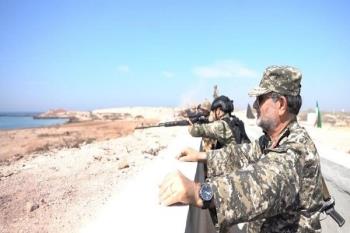Alwaght- The Saudi Arabian navy started its war games in the Strait of Hormuz on October 4. Codenamed Exercises (Persian) Gulf Shield 1, the military drills include warships, speedboats, aeromarine forces, marine corps, and marine security special forces, and were held in the Persian Gulf, Strait of Hormuz, and the Sea of Oman. According to the Saudi sources, this is the first in a string of further maneuvers that are set to be held by the kingdom’s military forces in the future.
The Saudi Arabian navy has 13,500 forces, 3,000 of them are marine crops. The Reuters has reported, quoting the Saudi official news agency SPA, that the military exercises are held to test combat capabilities and readiness of the forces of the Royal Saudi Navy to address any possible hostile actions against the kingdom.
Riyadh's aims behind the maneuvers
1. Displaying the kingdom’s military strength: The overarching goal of Saudi Arabia of the recent war exercises is to put on show its military power. To obtain its goals in the region including naval superiority over the regional rivals as well as expanding its military operations in the sea, the kingdom will need to show off military potentials of its air forces, navy, and ground forces.
2. Naval superiority: Although making huge foreign-made arms purchases and having highly dependent forces which rely on foreign backing to protect themselves, Riyadh is striving after a strategic naval supremacy as it holds long sea borders with the Arab countries of southern coast of the Persian Gulf. After all, one of the threats that the kingdom could face in the future is naval which has begun to take attention of the Saudi military leaders.
3. Trying to bring under control the significant sea areas like Persian Gulf and Strait of Hormuz: By holding the massive exercises, Saudi Arabia wanted to send the message that it will respond to any future military threats in the region with tough military reactions. Persian Gulf and Strait of Hormuz are main oil exporting gates and actually are its vital life lines. Any escalation of tensions in the region will directly mean damage to the economic security and thus damage to the regime’s political security and stability. Furthermore, Ansarullah movement gained further strength and turned into a key player in the neighboring Yemen and it possibly will seize control of such important regions of the country as Strait of Bab-el-Mandeb. Also a week ago the Emirati naval vessel was targeted and destroyed by this Yemeni movement. All these factors push Riyadh to send a message that once Ansarullah targets its naval vessels, it will face the kingdom’s responses.
What are the Implications?
1. Escalation of tensions in the region: Saudi Arabia is holding war games in an area that is way away from its territorial waters, a move that can fan tensions between the kingdom and its neighbors like Iran once Riyadh crosses the commonly set limits.
2. Saudi Arabia by itself is incapable of holding and managing the war games. The US and, according to some media reports, the Israeli regime have joined the maneuvers. This military coalition sounds the alarm bells for possible future threats against Iran’s southern coasts as well as the Persian Gulf as a whole.
3. The military exercises can be a prelude to other Arab states to join them, as at the same time transregional players could come to the region under excuse of the military drills. The Arab countries themselves are in rivalry for superiority and leadership in the tense region, something that could motivate them to hold similar military drills. This in turn will urge presence of international players.
Finally, Due to frequent failures in Yemen and Syria fronts and because of the recent US Congress' bill dubbed JASTA (Justice Against Sponsors of Terrorism Act) which allows suing the kingdom for supporting 9/11 terror attacks, Saudi Arabia wants to flex muscles militarily to the regional and international players. On the other side, due to targeting the Emirati naval vessel taking part in anti-Yemeni Saudi-led Arab campaign and also because of the Yemeni army’s new approach for taking on Saudi Arabia in the sea front, the kingdom seeks to send a message that it is preparing itself for any threats in the future. But the experts suggest that because of dependence of the Saudi regime in terms of weapons provision to foreign sides, the military drills are not more than a simple show, and that Riyadh lacks the potentials to seriously address any threats in the future.



























